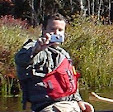 |
| The boats are loaded |
As I was driving up to New Hampshire I heard a report
on the radio about all the college football “bowl games” that would be played on
New Year’s Day. The final comment
was that it would be a “great day to hang out on the couch”. I don’t think so! I was on my way up to First Day in Franklin
to paddle the New Year’s Day Icicle Run with the Merrimack Valley Paddlers.
New Year’s Day trips are a tradition among
northeast whitewater paddlers, and probably many others. I’ve spent New Year’s Day on the Branch
River, at Fife Brook on the Deerfield, and at Crystal and Tville on the
Farmington. This would be my first
run at the best known of these events – the Merrimack Valley Paddler (MVP) run
on the Lower Winni.
 |
| At the put-in |
The Winnipesaukee River (otherwise
known as the Winni) is a 10-mile river that that runs from Lake Winnipesaukee to
Franklin where it joins with the Pemigewasset River to form the Merrimack. There are two distinct sections of the
Winni. The upstream section connects a chain of lakes from Lake Winnipesaukee
to Winnisquam Lake, and finally to Silver Lake. The lower section begins at Silver Lake and passes though
Tilton before entering a narrow valley that runs into Franklin.
There are two whitewater
runs as the Winnipesaukee flows through Tilton and Franklin. The Upper Winni
runs from Tilton Road to Riverfront
Park in Tilton. It’s an easy class I/II run that is the
site of an annual slalom race. I
have run a couple of times in the past.
 |
| The first shredder heads out |
The Lower Winni runs from Cross Mill Road Bridge to the Trestle
View Park in Franklin. This is a class III(+) run that is a
little above my comfort level in my canoe. When I heard that the MVP would be doing shredder runs, I jumped at the
opportunity. This would give me a chance to see the rapids at this higher water
level, and what can go wrong in a shredder. Famous last words!
A shredder is a two-man cataraft designed specifically for paddling big whitewater. It is
relatively easy to control with forward and backstrokes, and is very stable as
long as you keep it straight and moving forward as you punch through holes and
drops.
I
would be one six paddlers
in the MVP’s three shredders. We
met at the Unitarian Universalist Church at the other end of Central Street from Trestle View
Park to change and inflate the boats. We then shuttled up to the put-in at the Cross Mill Road Bridge. The river was at a typical
level for this event – 4 feet, 1,100 cfs.
Above 1,500 cfs. several of the rapids are rated class IV. I’d like to do a first run in my canoe
at between 500 cfs and 700 cfs. It’s a relatively short run at about a
mile-and-a-half, and most people run it a couple of times.
 |
| Taking the left line at Coliseum |
The river starts off with
waves and rocks as we ran through Snowmobile and Iron Ring. The first major rapid is known as Coliseum. At higher water levels this can be a very dangerous
rapid since about a third of the river channels into the foundation of an old mill
building – the “Room of Doom”. At higher water levels there is a centerline that follows a boulder-strewn drop to the left of
the foundation wall. Most paddlers take the left line that catches an eddy and takes you in “Z” pattern
through the rapid avoiding the rock in the center. We went left on both runs.
 |
| View from the bridge of Zippy's |
Another half-mile downstream
is the next major rapid – Railroad. The river splits around the
center trestle of a railroad bridge with routes on the right and the left. The left channel is probably easier, but we went right on both runs where there is a 3-foot drop directly below the bridge. We punched through the drop fine on the
first run, but on the second we got turned sideways in the hole. As we got sucked back into the hole, I
hit the current coming down the drop and got swept off the boat. It was a short
swim, and fortunately Bob was able to stay in the boat. I was soon back on
board and we continued downstream
There were more rocks and
waves as we ran through Sulphite to the the last rapid - Zippy's Final Plunge. The river runs under another railroad
bridge – this time with three abutments creating five channels. The second channel from the left is
usually the easiest, with the middle channel being passable at higher
water. We hit the middle channel
perfectly on our first run. On our second run, we lined up to run the middle
channel, but drifted too far left.
At the last minute we shifted hard to the left and hit the left channel.




No comments:
Post a Comment
Note: Only a member of this blog may post a comment.